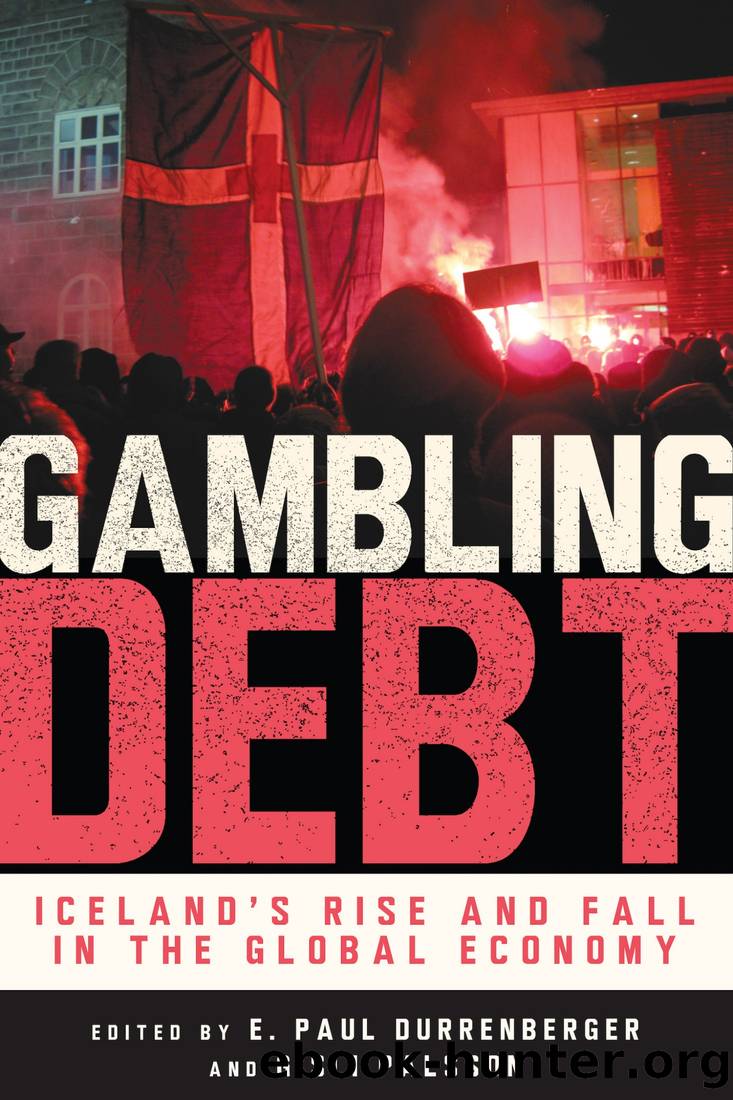Gambling Debt by E. Paul Durrenberger & Gisli Palsson

Author:E. Paul Durrenberger & Gisli Palsson [Durrenberger, E. Paul & Palsson, Gisli]
Language: eng
Format: epub
Published: 2015-05-03T16:00:00+00:00
Post-Crisis Effects and Property Concerns
The response of the fishing industry to the financial crisis was at first somewhat ambivalent, given that the currencyâs depreciation led not just to an increase in debts but also in a sharp increase in fishing revenues.13 However, as the extent of the industryâs insolvency began to unfold, opinions became less muted. It is estimated that the fishing industry owes somewhere in the region of ISK 465 billion or up to twelve times the industryâs annual profits (Ãslandsbanki Seafood Team 2010).14 What Arnason was praising as the natural ability of âliving capitalâ to stimulate the economy is now looked upon in many quarters as speculative gambling that has mortgaged the entire industry and future generations of fishermen without any significant improvement in boats, processing facilities, or fishing technology. Despite or maybe because of these issues, fishing, and particularly the conflict over quotas, has once again taken on renewed significance both nationally and in small coastal towns around the country.
The economic crisis that inevitably followed the financial one turned the focus to nonfinancial industries that a small island population can sustain, and fishing was seen as a central component of this plan. The new government set up a parliamentary working committee on fisheries consisting of twenty members from political parties, industry groups, and academia. The commission was tasked with nothing less than âdefining the main conflicting areas within the fisheries and to come up with sustainable solutions that would win the broadest support of the nation.â15 The dealings of the commission crystallized around two pertinent issues. First, a debate ensued as to whether the first article of the fisheries law, which designates fish as the common property of the nation, should be enshrined in the constitution as a way of unambiguously clarifying its property status. Second, and more contentious, was the proposal to revoke the quota, a move that would allow currently excluded fisherman to regain access to the sea.16 Although many groups have given voice to this suggestion in the past, it was the post-crisis reconfiguration of fishing that created an environment, or a âgenerative moment,â as Bruce Kapferer (2005) puts it, in which the tensions around fish began to fully play out, and it was a series of antecedent legislative measures on the status of fishing rights as property around which such tensions coalesced.
The typical anthropological understanding of property ranges from a relationship between persons and things, a person-to-person relationship mediated through things, or a relationship between persons in relation to a thing. Of course these definitions all raise the question, what is a person, thing, or even, for that matter, a relation? I would like to temporarily park these more vexing issues and focus right now on how legal and economic concepts are based on a similar type of understanding. The standard legal register of property is one of rights; rather than property being an actual thing, it is seen as a relationship that a person has toward a thing, wherein a critical mass of rightsâor a bundle of rightsâaccrues to someone in relation to it.
Download
This site does not store any files on its server. We only index and link to content provided by other sites. Please contact the content providers to delete copyright contents if any and email us, we'll remove relevant links or contents immediately.
Room 212 by Kate Stewart(5091)
The Crown by Robert Lacey(4791)
Endurance: Shackleton's Incredible Voyage by Alfred Lansing(4743)
The Iron Duke by The Iron Duke(4337)
The Rape of Nanking by Iris Chang(4189)
Joan of Arc by Mary Gordon(4080)
Killing England by Bill O'Reilly(3987)
Say Nothing by Patrick Radden Keefe(3965)
I'll Give You the Sun by Jandy Nelson(3417)
Shadow of Night by Deborah Harkness(3343)
Hitler's Monsters by Eric Kurlander(3320)
Mary, Queen of Scots, and the Murder of Lord Darnley by Alison Weir(3189)
Blood and Sand by Alex Von Tunzelmann(3181)
Eleanor & Park by Rainbow Rowell(3141)
Darkest Hour by Anthony McCarten(3112)
Margaret Thatcher: The Autobiography by Thatcher Margaret(3065)
Book of Life by Deborah Harkness(2913)
Red Famine: Stalin's War on Ukraine by Anne Applebaum(2910)
The One Memory of Flora Banks by Emily Barr(2848)
